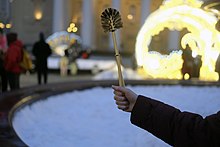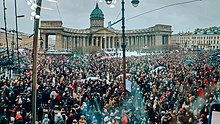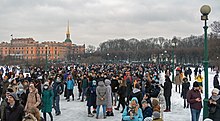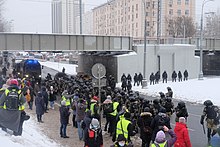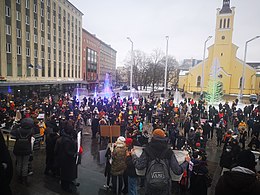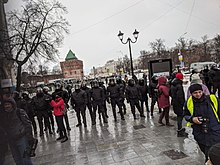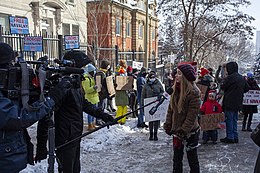2021 Russian protests
[66][67] Though the Kremlin denied involvement in his poisoning,[68] the EU and the UK responded by imposing sanctions on six senior Russian officials and a state chemical centre.
[81] By the next day the state communications watchdog Roskomnadzor was demanding the social networks VKontakte (VK) and TikTok to stop the spread of calls to the protests.
[86] On 22 January, the Main Directorate of the Ministry of Internal Affairs for Moscow issued a statement warning against calls to the protests or participation in them.
It stated that any attempts to hold unauthorized events as well as “provocative actions by the participants” would be regarded as a “threat to public order” and be “immediately suppressed”.
[88] Roskomnadzor also stated that VK, Instagram, TikTok and YouTube blocked some content which involved “calls for children to participate in illegal mass events”.
[111][112][113] According to Novaya Gazeta, around 1,000 protesters gathered in Khabarovsk by Lenin Square in support of both Navalny and the arrested former governor Sergey Furgal before police dispersed the crowd and started detaining participants.
Communication issues were reported in cities including Moscow, St. Petersburg, Krasnodar, Tyumen, Chelyabinsk, Yekaterinburg, Voronezh, Rostov-on-Don, and Saratov.
Leonid Volkov, co-founder of Russia of the Future party, said that Navalny's team plans to organize more protests on 31 January, and then, on every subsequent Saturday or Sunday until their demands are met (somewhat similar to what is happening in Belarus since August 2020).
He said the organizers had decided to gather protesters outside the FSB building because they are the "poisoners" and the offices of the presidential administration because they "make the decisions about whether to jail or release Navalny".
The head of the FBK, Ivan Zhdanov, said that the Ministry of Internal Affairs carried out the searches within the framework of Article 236 of the Criminal Code of Russia related to violations of sanitary and epidemiological standards.
[42] On 4 February, Leonid Volkov, Navalny's chief of staff, announced that protests would be suspended until at least spring to focus on the parliamentary elections in autumn.
The response was an unprecedented wave of violence and repression... We need to find a way to overcome it and hold an event that riot police could not prevent and everyone could attend".
[200] On 11 February, Russian federal prosecutors warned against participation and incitement of unauthorized mass demonstrations, threatening felony charges against Internet users who advocated "riots".
[203][204] A medic who worked at a coronavirus hospital in Moscow posted a widely-shared photo of him taking part in the flashlight protest, however said that he was fired the next day, saying "this is what they do to all dissenters in Russia".
[205] In Moscow, hundreds of women formed a "chain of solidarity" along Arbat Street to support Navalny's wife and female victims of repression, taking inspiration from the women-led protests held in Belarus.
[207] An authorized rally against repression was held in Kazan at Millennium Square, organized by representatives of Yabloko, PARNAS, and Left Front.
[214] Within that time, large-scale demonstrations had begun in Irkutsk, Novosibirsk, Perm, and Yekaterinburg, with protests beginning to flare up in Moscow and Saint Petersburg, and police setting up barricades in many of the aforementioned cities.
[223] On 12 May, opposition politician and former mayor of Yekaterinburg, Yevgeny Roizman, was sentenced to nine days in jail for "organizing an unsanctioned event" on 31 January and 21 April through his Twitter account.
[226] On 9 June, Navalny's political network, including his headquarters and the FBK, were designated as extremist organizations and liquidated by the Moscow City Court.
[231] Navalny's chief of staff, Leonid Volkov, called the protests a "victory over fear" and a "real nationwide movement that unites a wide variety of people".
[232] According to a poll by the Levada Center carried out from 29 January to 2 February 2021, 21% of Russian respondents said they followed the protests closely, 59% said they heard about it, and 19% said they did not hear anything about it.
[241][242][243] A petition by Novaya Gazeta demanded a change to the law on rallies and demonstrations in accordance with the Constitution of the Russian Federation and to guarantee citizens the right of peaceful assembly.
The petition by Novaya Gazeta demanding for Navalny's release was signed by over 200,000 people,[244] including numerous celebrities and public figures.
[245][246][247][248] Amnesty International published a request for collective assistance in writing appeals in order to achieve justice in the case of Margarita Yudina, who was beaten during the protest.
He also urged Russia to "fully cooperate with the international community's investigation into the poisoning of Aleksey Navalny and credibly explain the use of a chemical weapon on its soil".
[263][264] The EU's High Representative Josep Borrell said that he would press for the release of Navalny when he visits Moscow on 5 February 2021, saying that it would be "a good opportunity to discuss with my Russian counterpart all relevant issues, to pass clear messages on the current situation".
[267] New York Rangers winger Artemi Panarin expressed his support for Navalny,[268] and shortly after took absentee of leave following allegations he assaulted an 18-year old Russian in 2011.
[269] Solidarity protests were also held in cities around the world on 23 January 2021, including Berlin, Munich, Paris, Prague, Kraków, Helsinki, London, Tallinn, The Hague, Denver, Vienna, Tel Aviv, Copenhagen, Melbourne, Sydney, Montreal and Tokyo.
[270] The solidarity movement of Russian communities abroad further expanded, as a total of around 3,000 participated in rallies across several major European cities as well as Philadelphia and San Francisco.
[281] 21 April In solidarity with Navalny's hunger strike protests were held in a range of Russian and international cities among which are Rome, Riga, Tbilisi, London, Berlin, Hagatna and Tel Aviv.
